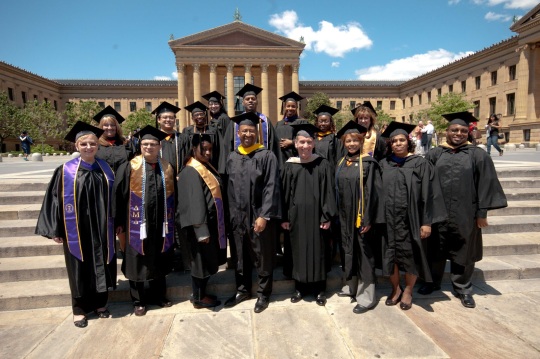In higher education, there’s the rhetoric and there’s the reality. Nationwide, only 58% of those who entered college in 2004 have finished four years and received a bachelor’s degree, according to the
National Center for Education Statistics.It’s a depressingly low figure. But Deborah Diamond, President of Campus Philly, an organization aimed at retaining Philadelphia’s degree holders post-graduation, says that other statistics point to value.
“There is an 84% wage differential between those who do not have a college degree versus those who do,” Diamond says.
In an effort to increase college graduation rates nationwide, CEOs for Cities has created the
Talent Dividend Prize, a $1 million award to the city with the greatest increase in post-secondary degrees over four years. The competition, which ends in 2014, has attracted 57 cities.
Philadelphia stands out with its programs that emphasize college graduation and retention, and serve as models for cities around the country.
Philadelphia’s higher ed power trio is Campus Philly’s Deborah Diamond; Hadass Sheffer, President of
Graduate Philadelphia; and Claire Marazzo-Greenwood, Director for Policy Development at
Select Greater Philadelphia. Working in concert, the three women seek to increase Philadelphia’s civic and economic growth by degrees.
Graduate Philadelphia has a particular focus on adults who started but never finished college.
“In Philadelphia, the same number of people were graduating as dropping out. One in five were graduating, and 1 in 5 were dropping out,” Hadass Sheffer says. Looking around the country in 2004 for organizational models, Sheffer says, “We spent 6 months interviewing, and found no one was paying attention to this population.”
Graduate Philadelphia, funded by United Way, the Lumina Foundation, Texas Guaranteed, and The City of Philadelphia, has now helped 1500 people go back to college, with a 95% retention rate. The organization helped launch programs in Connecticut, Chicago and Memphis.
“Philadelphia is unique among the 57 cities competing because we are not starting from zero,” says Deborah Diamond of Campus Philly, who credits the cooperation of the Mayor’s Office, Philadelphia Youth Network, World Class Philadelphia, The Greater Philadelphia Chamber of Commerce and The Economy League. “We’re using this challenge as a platform to get other people invested and to build awareness of the problem.”
Claire Marazzo-Greenwood says, “The Talent Dividend prize is less about importing talent, and more about encouraging residents to take advantage of the 101 colleges in our region.” The growth rate for degrees conferred in the greater Philadelphia area averages about 4-5% per year, says Marazzo-Greenwood, with about 85,000 degrees now awarded annually.
Kimberly Lowe is one example of a Graduate Philadelphia success story. After 9 years as a corrections officer, Lowe was
forced to go on disability. She had never gotten her college degree, but a chance visit to the Graduate Philadelphia office led to Bachelor’s and Master’s degrees, and Lowe begins work on a doctoral degree this fall.
“What a difference four years have made in my life,” says Lowe, a resident of North Philadelphia, one of the city’s toughest neighborhoods.
Prior to her involvement with Graduate Philadelphia, Lowe found the idea of college overwhelming and intimidating, but counselors at the organization presented a low-pressure, financially feasible path.
Philadelphia’s success is due to dedicated players who have learned by doing. Sheffer has a number of suggestions for other cities working to increase post-secondary degrees.
“Our approach is to identify productive partnerships.” Graduate Philadelphia’s biggest partnership by far, says Sheffer, is with area colleges. “Building and maintaining partnerships has to be someone’s job and a high organizational priority. Make sure the right organizations are at the table, that they have capacity to partner, that there is some stability, that the cultures match, or if they don’t that there are ways to make the partnership work for the partners and the clients.
“Take on at least an equitable share of the heavy lifting,” she says. “Share your resources whenever you can. Share the credit for good things that happen. Thank people for their work. Be the first to own mistakes. Be transparent. Establish ground rules and standards. Allow space for hard conversations and don’t shy away from tackling and facilitating them. Recognize your own limitations. Be fair and equitable. This all sounds trite, because you will find it on any list for building and maintaining partnerships, but this is the work.
“One big lesson for other regions is to get businesses on board as investing partners,” Sheffer adds. “One of our early mistakes was that we did not require all partners to invest cash into the initiative. But it created some problems of ownership and commitment. So in Connecticut and Memphis, that was an upfront requirement, and it worked better. We brought it back to Philadelphia in 2012.”
Claire Marazzo-Greenwood looks at the larger, long term picture.
“The prize is important. But winning a million dollars is icing on the cake,” she says. “The work is really about how to leverage national attention to highlight practices that are already going on, and identify resources that can make it scalable.”
Changing the course of a large ship by a few degrees (or hundreds) results in a more productive region as a whole. As Kimberly Lowe discovered, getting started is the hardest thing, and some of your best resources are right in front of you.

